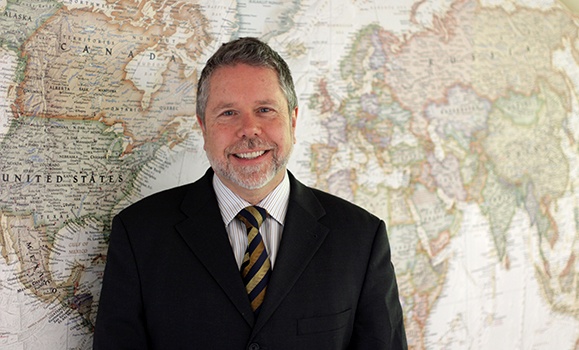A new arrival to Halifax, Philip Shea recently joined Dalhousie as the director of the International Centre in Halifax, where he is working with the team to develop and enhance international partnerships for students, enrich the international student experience at Dal, and promote opportunities for all students to engage in international activities.
Fluent in Portuguese, Philip has spent 25 years working in higher education and international development around the world, including in Brazil and Timor. In Angola and Mozambique, he worked with organizations to help economically empower women. His early years in international development also took him to post-conflict countries, such as Bosnia-Herzegovina, where he worked for the Organization for Security and Co-operation in Europe.
Philip’s more recent involvement in higher education has taken him to institutions in the United States, Manitoba, and various locations in Ontario — including as the assistant registrar, international at the University of Ontario Institute of Technology, and most recently as the associate director of York International at York University.
Outside the office, Philip has served on the board of the Canadian Bureau for International Education where he played a role in founding its International Mobility Chapter, and channeled his passion for civil rights and social action by leading an Amnesty International group in Toronto.
Philip was kind enough to answer some questions as he settled into the second week of his new role.
Where did you grow up?
Winnipeg
Where did you go to university?
University of Manitoba for my undergraduate degree; Philadelphia for my grad degree.
What did you study?
At U of M, I started off in computer science but switched to production operations management. [Philip also did his MBA at Eastern University in Pennsylvania with a specialization in Development Economics.]
Why did you choose to come to Dal?
It is a great community with a long successful history of international education, which includes supporting international students and scholars, and international mobility for all students.
What’s one thing you’ve accomplished in your career that you’re proud of?
Early in my “career,” as a full time volunteer in a L’Arche community, enabling a Down syndrome adult to reach his job by public transit. It had been said that he would never be able to learn how to. It demonstrated to me greatly how empowering others leads to theirs and the community’s success.
What's one thing you want to do to improve Student Services/the student experience?
Building stronger resources through the public website for international students. This can support recruitment and retention, and the acculturation of students to Canada, Nova Scotia and to Dal.
What do you most enjoy about Dal so far?
The collegiality of the International Centre team.
What did you want to be when you grew up?
Not so much "what" as "where." I knew that I wanted to work globally.
What do you want to be when you grow up?
Learn more languages, i.e. a polyglot. [Apart from his fluency in English and Portuguese, Philip also speaks some Spanish, French, and German.]
What do you do in your spare time?
Swim and try to strengthen my kayaking skills.
What are you passionate about?
Social justice. I’ve sponsored LGBTQ refugees to come to Canada and plan to get involved in the same here in Halifax.
What do you never leave home without?
Addresses of friends around the world, but now they’re all in the “Cloud.”
Favourite musical act?
A Brazilian band called Tribulistas.
Favourite movie?
Babette’s Feast (Danish) or Antonia’s Line (Dutch). They’re both about strong female role models.
Favourite food?
Malaysian as this is a combination of Thai, Chinese and Indian. My first good international student friends came from Malaysia, so this may be a biased response.
Q&A: Meet Philip Shea, the new director of Dal's International Centre
Peter Reimer - February 19, 2016

Philip Shea in Dal's International Centre in Halifax. (Ali Seglins photo)
